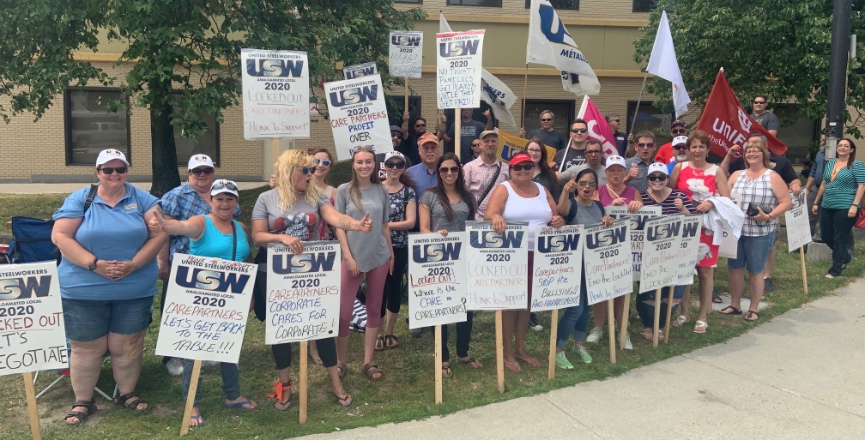CarePartners is failing its employees and clients, according to two unions that represent workers for the home care service provider.
The for-profit firm that provides home care for seniors across Ontario has been negotiating with SEIU Healthcare since March. SEIU represents about 2,600 CarePartners’ employees.
According to Tali Zrehen, SEIU’s director of home and community care, the employer’s behaviour has been disrespectful towards its workers through the bargaining process.
Low-wage work and poor scheduling
Most personal support workers (PSW) represented by SEIU get paid between $16.50 and $19 hourly. The majority are employed part time without benefits.
Workers are on duty for eight hours a day, but are only paid for the time they are booked by CarePartners to spend with clients. That can mean being paid for three or four hours while being booked from 7 a.m. to 3 p.m.
The erratic scheduling can translate into inconsistency for clients who often have to deal with new PSWs as opposed to familiar caregivers.
CarePartners referred rabble.ca to its public relations representative, who didn’t respond to requests for comment.
Zrehen says that CarePartners, which has rejected the proposal of having more reliable working hours, doesn’t even bother informing clients when PSWs are unable to visit them.
As part of its campaign to raise awareness about the employer’s practices, SEIU says it has received negative feedback from clients.
“The clients say that these PSWs are amazing: ‘We love the care that we receive from these individuals, but the company that they work for is awful,'” Zrehen says.
Dog bites, bed bugs and violence
Providing care for seniors is a challenging task — a fact that can be attested to by hospital and nursing home staff. But providing care at their homes can be particularly difficult.
Zrehen says that health and safety is a critical issue for personal support workers who face risks at work, but can’t fall back on sick days in the event of an injury.
“We’re talking about members going in and getting dog bites,” she says. “And then they have a decision, ‘Do I go to work the next day? Or can I not go to work? Because I’m injured or could I lose out on that income?'”
Zrehen points to other issues such as dealing with bed bugs, when visiting hoarders hampered by severe mental health issues, or stepping on needles when caring for addicts since the employer doesn’t provide safety boots.
Like nursing homes, where seniors suffering from dementia can act violently against care providers, home care presents the same risk.
Often times in those circumstances, personal support workers can benefit from additional hands on deck, but Zrehen says that the employer wouldn’t spend money on more staff.
Schedulers still locked out in Sudbury
For the past 12 weeks, 30 CarePartners administrative employees who schedule shifts for PSWs have been locked out since bargaining failed with United Steelworkers local 2020.
Mike Scott, a USW representative, says workers are seeking to modestly increase their wage, retain their pensions plus benefits and the inclusion of protections against harassment.
The workers get paid around $16 an hour or less, despite many of them having college diplomas and university degrees, according to Scott.
“I think they’ve got less than a $1 raise in five years,” he says. “And they went through a period of about five years prior to that with no raises before we organized.”
The company is looking to get rid of their pension, says Scott, which they had through a previous employer before CarePartners took over.
He says that in order to maximize profit, the company pressures the workers to make as many bookings as possible.
“We want some joint investigation language that looks into the workplace harassment and bullying. Especially from management to our members,” Scott says. “That’s all, nothing really big.”
The union has reached out to Christine Elliot, Ontario’s minister of health, only to hear that the government won’t intervene in the bargaining process.
Scott says that NDP politicians such as local Sudbury MPP Jamie West have been supportive of the workers, but no other party has been helpful.
“An unregulated industry”
Zrehen points out that while home care is funded by taxpayer dollars, companies like CarePartners exploit workers for profit.
Over the years, as the government has promoted home care as an alternative to nursing homes, businesses have taken advantage of weak government regulations.
“It’s [a] massively growing system. It’s unregulated, and is really being run by a class of working class women who are bearing the brunt of our healthcare system,” Zrehen says.
Zaid Noorsumar is rabble’s labour beat reporter for 2019, and is a journalist who has previously contributed to CBC, The Canadian Press, the Toronto Star and Rankandfile.ca. To contact Zaid with story leads, email zaid[at]rabble.ca.
Image: USW




